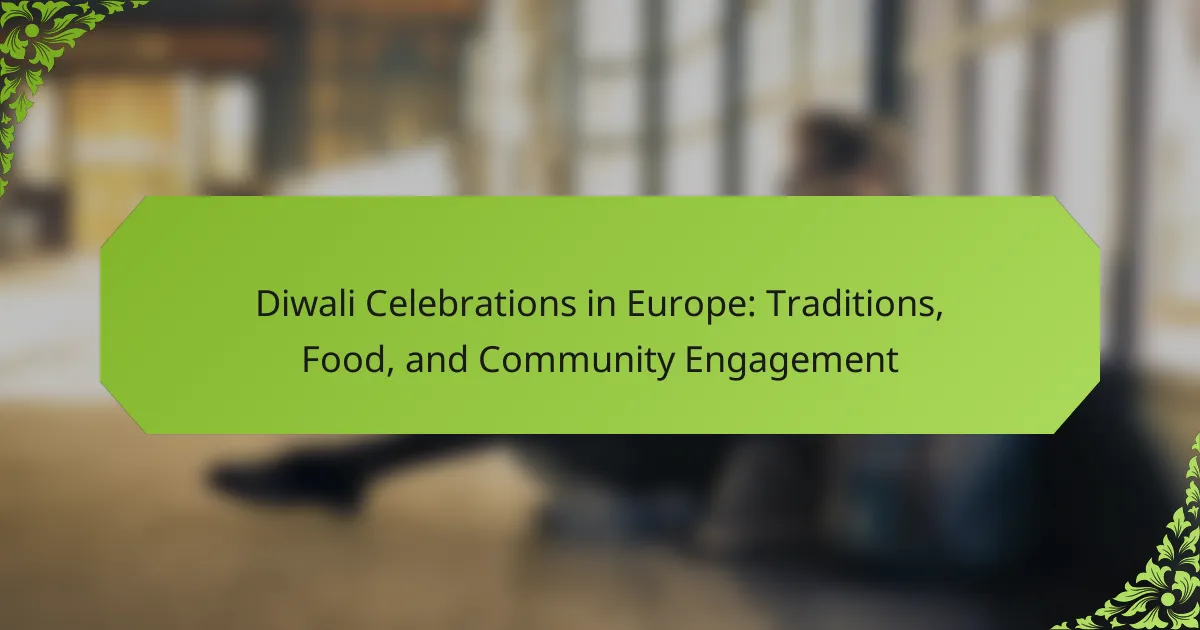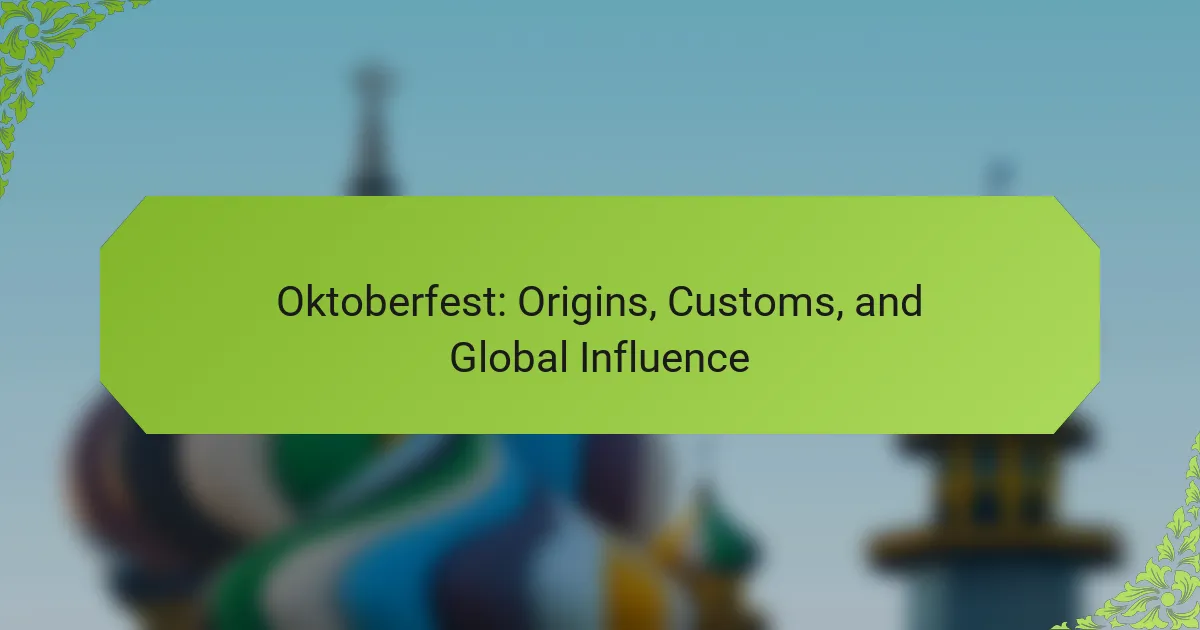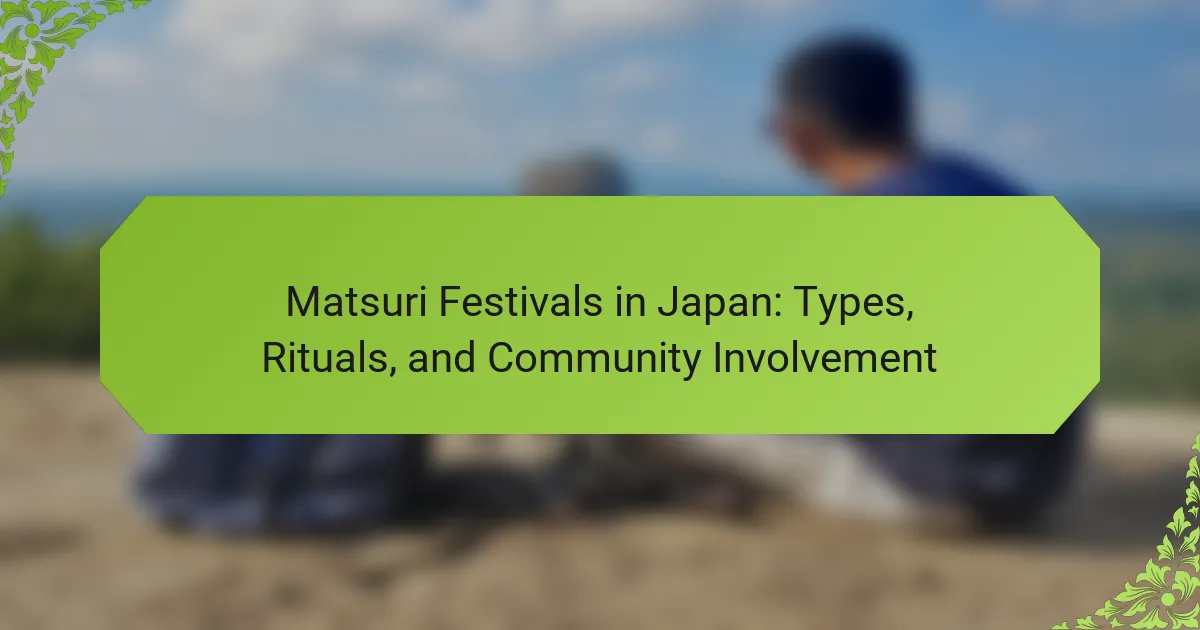Diwali celebrations in Europe highlight vibrant traditions, diverse food, and community engagement. Each country showcases unique festivities, from fireworks in the UK to cultural events in Germany. Traditional foods like ladoos and biryani enhance the festive spirit, while community outreach initiatives promote inclusivity and generosity. Challenges such as limited awareness and resource constraints affect participation, but individuals can engage meaningfully through local events and cultural practices.
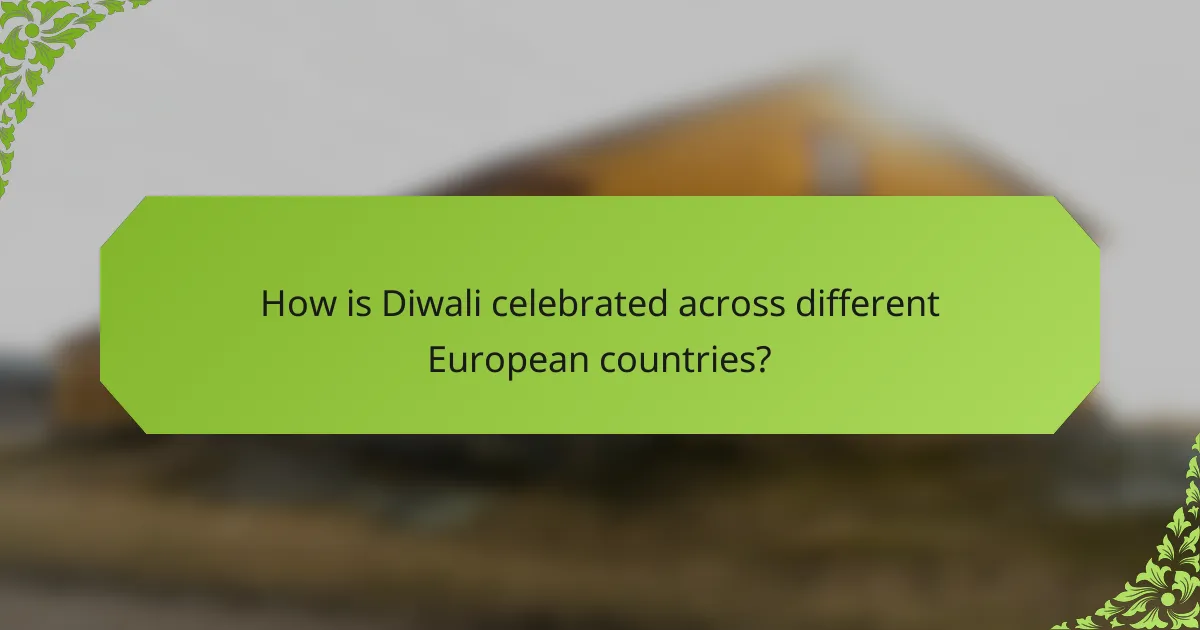
How is Diwali celebrated across different European countries?
Diwali is celebrated in various European countries with unique traditions, food, and community engagement. In the UK, vibrant festivals feature fireworks, traditional Indian dances, and communal meals. In Germany, Diwali is marked by cultural events showcasing Indian art and cuisine, with a focus on community gatherings. France celebrates with family gatherings and the sharing of sweets, while the Netherlands hosts public events that highlight the festival’s significance. Italy has growing celebrations, emphasizing local Indian communities. Overall, Diwali fosters cultural exchange and unity across Europe.
What are the common traditions observed during Diwali in Europe?
Diwali celebrations in Europe feature vibrant traditions, including lighting diyas, decorating homes, and community gatherings. Families often prepare special foods like sweets and savory snacks. Cultural events, such as dance performances and music, enhance community engagement. Unique to Europe, some cities host Diwali festivals in public spaces, fostering inclusivity.
How do local customs influence Diwali festivities in various regions?
Local customs significantly shape Diwali festivities across Europe, reflecting diverse cultural influences. In the UK, vibrant community events blend traditional Indian practices with local customs, showcasing food like samosas and sweets. In Germany, Diwali celebrations often emphasize eco-friendly practices, integrating sustainable decorations. France highlights artistic expressions through Diwali-themed exhibitions and performances. Each region fosters unique community engagement, enhancing the festive spirit while honoring local traditions.
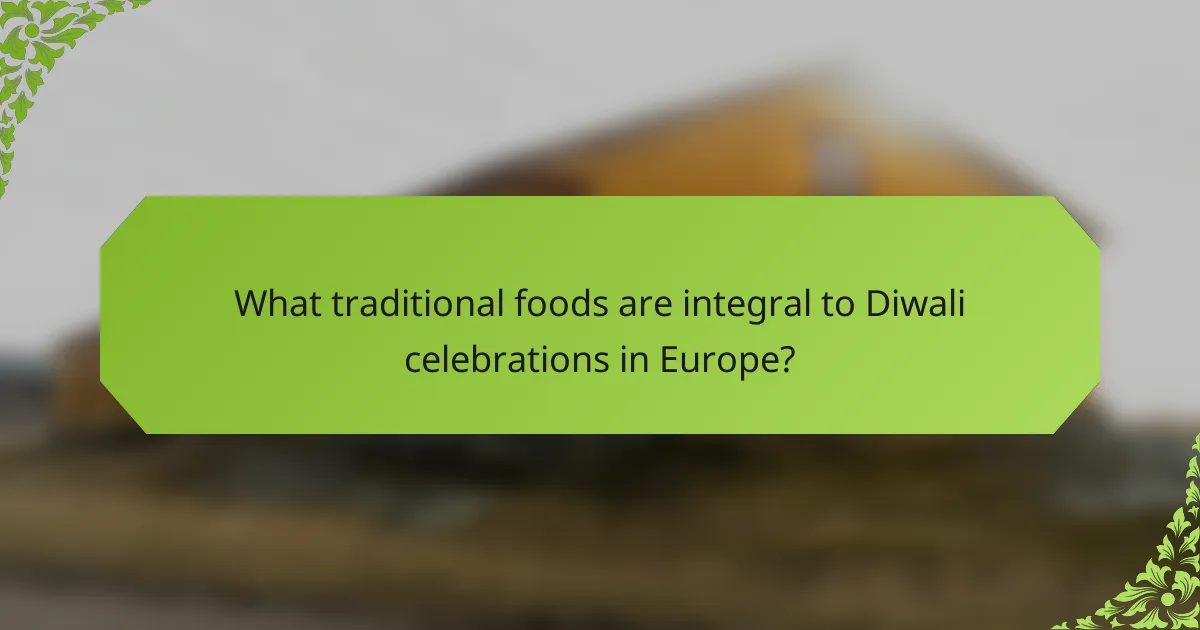
What traditional foods are integral to Diwali celebrations in Europe?
Traditional foods integral to Diwali celebrations in Europe include sweets, savory snacks, and festive dishes. Popular items are ladoos, barfis, samosas, and biryani. These foods symbolize joy and community, enhancing the festive spirit. Many families prepare these dishes together, fostering cultural connections.
Which sweets and snacks are most popular during Diwali?
Popular sweets and snacks during Diwali include ladoos, barfis, and chaklis. These treats symbolize joy and are shared among families and friends. Ladoos, made from flour and sugar, are favorites. Barfis, often flavored with cardamom or nuts, offer a rich taste. Chaklis provide a savory option, balancing the sweetness of other snacks. In Europe, these traditional treats foster community engagement and cultural exchange during Diwali celebrations.
How do food traditions vary among different European communities?
Food traditions during Diwali celebrations in Europe reflect a blend of Indian culture and local influences. Communities often prepare traditional dishes like sweets, savory snacks, and festive meals, showcasing diverse culinary practices.
In the UK, for instance, Indian restaurants and families emphasize vegetarian dishes such as samosas and paneer tikka. In Germany, some communities incorporate local ingredients into traditional recipes, creating unique fusion dishes.
The engagement of communities during Diwali includes potlucks, where families share homemade dishes, fostering unity and cultural exchange. This practice highlights the communal aspect of food traditions, reinforcing bonds among participants.
Overall, Diwali food traditions in Europe vary, embodying a rich tapestry of cultural integration and celebration.
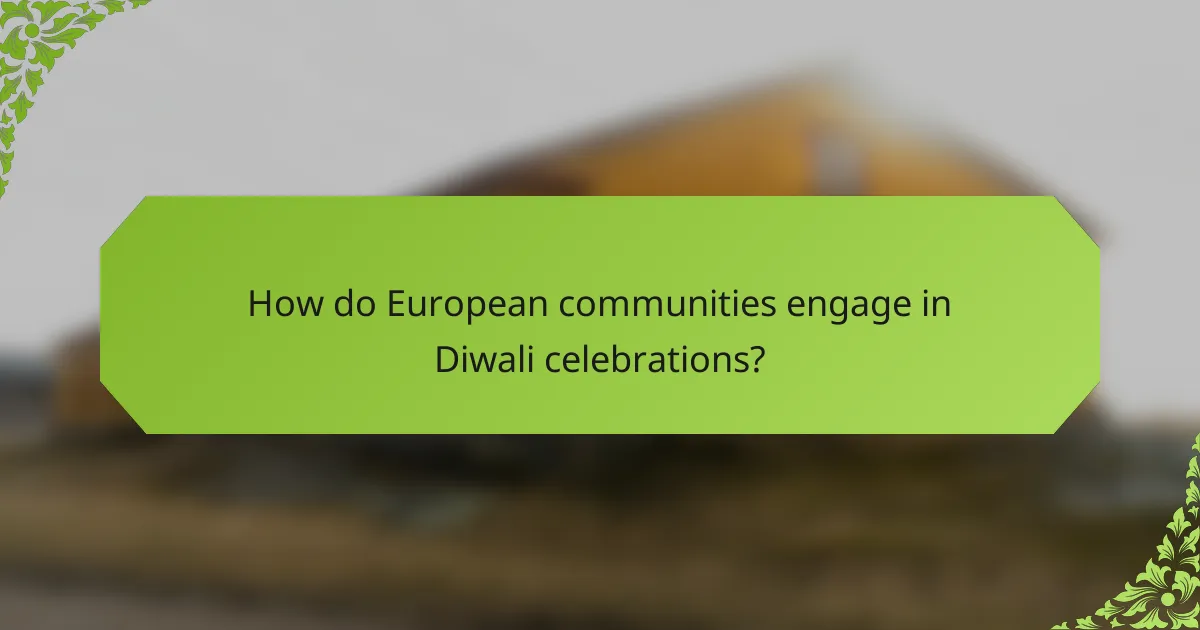
How do European communities engage in Diwali celebrations?
European communities engage in Diwali celebrations through vibrant festivals, cultural events, and communal activities. In cities like London, Leicester, and Paris, festivities include Diwali fairs featuring traditional music, dance, and art. Food plays a central role, with diverse Indian cuisines offered at community gatherings.
Many organizations host workshops to teach about Diwali’s significance and rituals, fostering cultural exchange. Unique attributes include the lighting of diyas and the creation of rangoli, which symbolize joy and prosperity. Rarely, some communities incorporate local customs, blending them with traditional Diwali practices, enhancing the celebration’s diversity.
What role do community organizations play in Diwali festivities?
Community organizations play a vital role in Diwali festivities by fostering inclusivity and cultural exchange. They organize events that celebrate traditions, such as communal prayers, dance performances, and food festivals. These gatherings strengthen community bonds and enhance participation among diverse groups. Additionally, organizations often provide resources for educational activities, ensuring younger generations understand the significance of Diwali. Their efforts contribute to a vibrant celebration that embraces both traditional and contemporary elements of the festival.
How do inter-community collaborations enhance Diwali celebrations?
Inter-community collaborations significantly enhance Diwali celebrations by fostering inclusivity and cultural exchange. These partnerships unite diverse communities, promoting shared experiences and understanding. Collaborative events often feature food festivals, workshops, and cultural performances that showcase various traditions. This not only enriches the celebratory atmosphere but also strengthens community bonds. Moreover, joint initiatives can lead to increased participation, ensuring that Diwali is celebrated in a vibrant and engaging manner across Europe.
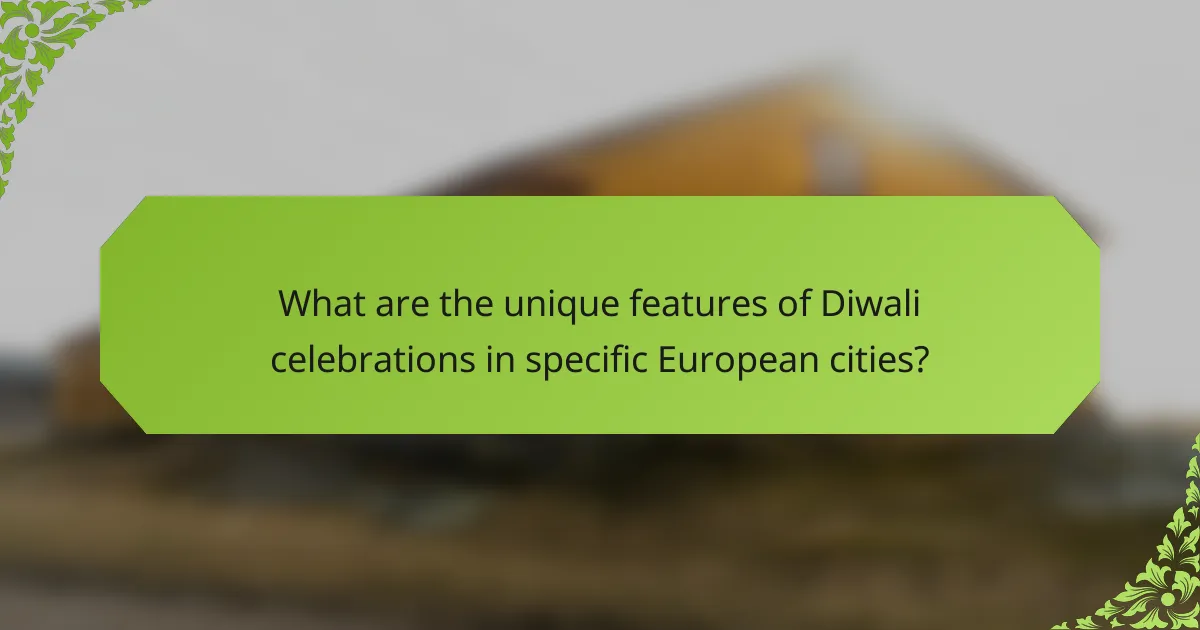
What are the unique features of Diwali celebrations in specific European cities?
Diwali celebrations in specific European cities feature unique traditions, foods, and community engagement. In London, vibrant street festivals showcase cultural performances and diverse cuisines. In Leicester, the largest Diwali celebration outside India includes a grand fireworks display. Paris highlights art exhibitions and workshops that promote Indian culture. In Amsterdam, local communities host lantern-making events, symbolizing the festival’s spirit. Each city emphasizes inclusivity, inviting people from various backgrounds to participate in the festivities.
How does the celebration in London differ from that in Berlin?
Diwali celebrations in London emphasize multiculturalism and community events, while Berlin focuses on traditional rituals and local customs. London features diverse food stalls and performances, attracting a wide audience. In contrast, Berlin’s celebrations often highlight specific cultural practices, including traditional music and dance. Both cities foster community engagement, yet their approaches reflect distinct cultural influences and local demographics.
Which unique events are held in cities with significant Indian populations?
Diwali celebrations in cities with significant Indian populations feature vibrant events that emphasize community engagement and cultural traditions. Cities like London, Leicester, and Amsterdam host grand festivities including light displays, traditional dances, and food fairs.
These events often showcase unique attributes such as regional cuisine, with Indian sweets and savory dishes taking center stage. For instance, London’s Diwali on the Square attracts thousands, highlighting the community’s diverse cultural expressions.
Leicester’s celebrations include a spectacular fireworks display, recognized as one of the largest in Europe. Amsterdam’s festivities incorporate music and dance, fostering community spirit among attendees.
Overall, these celebrations not only honor traditions but also strengthen community ties, making Diwali a significant event in these cities.
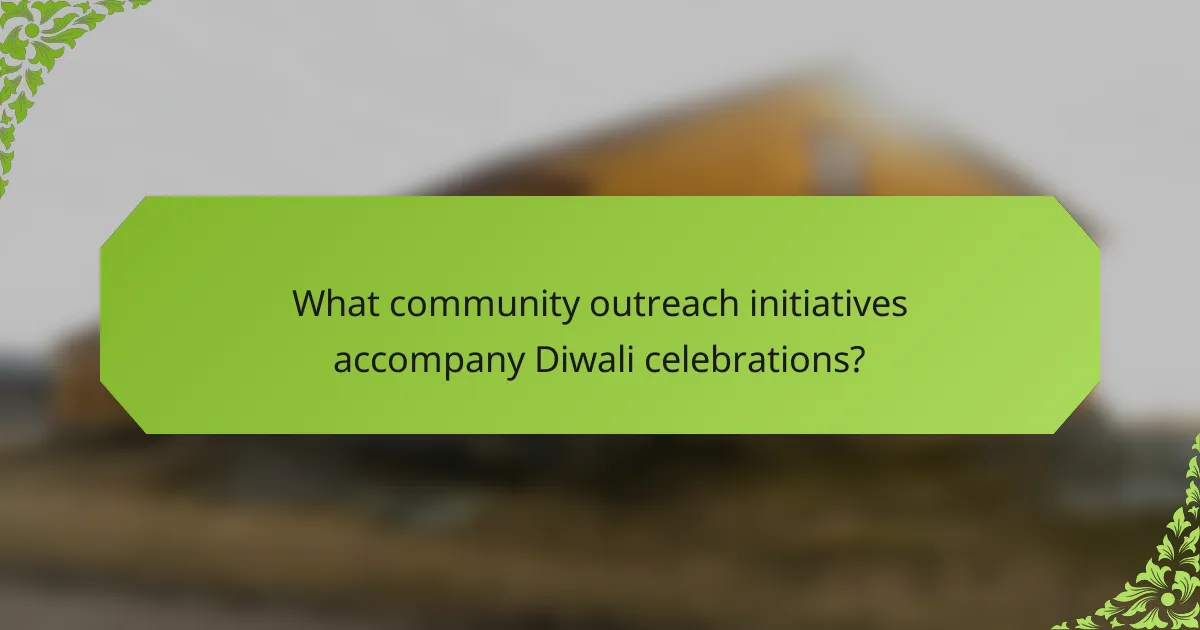
What community outreach initiatives accompany Diwali celebrations?
Community outreach initiatives during Diwali celebrations in Europe often include food drives, cultural workshops, and charity events. These initiatives foster community spirit and promote inclusivity. For instance, many organizations host events to distribute meals to those in need, highlighting the festival’s values of generosity and sharing. Cultural workshops allow participants to learn about Diwali traditions, enhancing cultural understanding and engagement. Additionally, charity events raise funds for local causes, reinforcing community bonds and support.
How do celebrations promote cultural understanding and inclusion?
Diwali celebrations in Europe enhance cultural understanding and inclusion by fostering community engagement and sharing diverse traditions. These festivities create opportunities for dialogue and interaction among different cultural groups.
Food plays a crucial role in Diwali, with traditional dishes like sweets and savory snacks being shared at community events. This culinary exchange promotes appreciation for Indian culture and encourages participation from various backgrounds.
Community events during Diwali often include cultural performances, workshops, and educational sessions. These activities invite individuals to learn about the significance of the festival, thus breaking down cultural barriers and building connections.
Overall, Diwali celebrations in Europe serve as a platform for cultural exchange, enriching the social fabric and promoting inclusivity among diverse populations.
What charity events are organized during Diwali in Europe?
Charity events during Diwali in Europe include cultural festivals, food drives, and fundraising galas. These events foster community engagement and support various causes. For instance, many cities host Diwali fairs where proceeds benefit local charities. Additionally, organizations often arrange donation drives for underprivileged communities, emphasizing the spirit of giving during the festival.
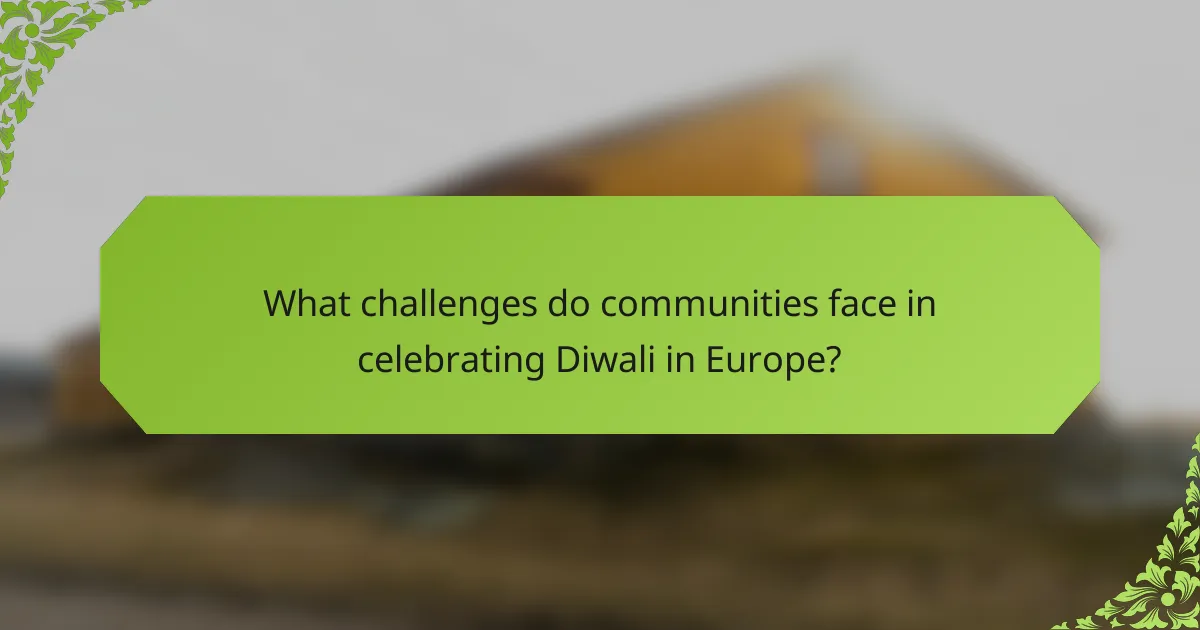
What challenges do communities face in celebrating Diwali in Europe?
Communities in Europe face several challenges in celebrating Diwali. Limited awareness of the festival among locals can hinder participation. Additionally, cultural differences may lead to misunderstandings about traditions. Access to traditional foods and materials is often restricted, affecting authentic celebrations. Moreover, organizing events requires funding and resources, which can be scarce in smaller communities. Lastly, balancing the celebration with local regulations and public health guidelines adds complexity to planning activities.
How do cultural differences impact the expression of Diwali traditions?
Cultural differences significantly shape the expression of Diwali traditions in Europe. Diverse communities adapt rituals, foods, and celebrations to reflect local customs and values.
For instance, traditional Indian sweets may be complemented by European desserts, creating a fusion of flavors. Community engagement varies, with some groups hosting public festivals while others prefer intimate family gatherings.
The unique attribute of Diwali in Europe is its emphasis on inclusivity, inviting non-Hindu neighbors to participate. This fosters cross-cultural understanding and strengthens community bonds.
Overall, Diwali celebrations in Europe highlight a blend of traditional and local influences, showcasing the adaptability of cultural practices.
What are common misconceptions about Diwali in European contexts?
Many misconceptions about Diwali in European contexts include the belief that it is solely an Indian festival or that it only involves fireworks. Diwali, also known as the Festival of Lights, is celebrated by diverse communities, including Hindus, Sikhs, and Jains, across Europe.
Some people think Diwali celebrations are limited to religious rituals. In reality, these celebrations encompass cultural events, community gatherings, and food festivals. Traditional dishes such as sweets and savory snacks play a significant role, showcasing the culinary diversity within the community.
Another misconception is that Diwali is celebrated on the same date every year. The festival’s timing varies, as it is based on the lunar calendar. This leads to different dates each year, often falling between October and November.
Lastly, there is a belief that Diwali is only about lighting lamps and fireworks. While these are important aspects, the festival also emphasizes themes like renewal, forgiveness, and community bonding, which are central to the celebrations in European contexts.
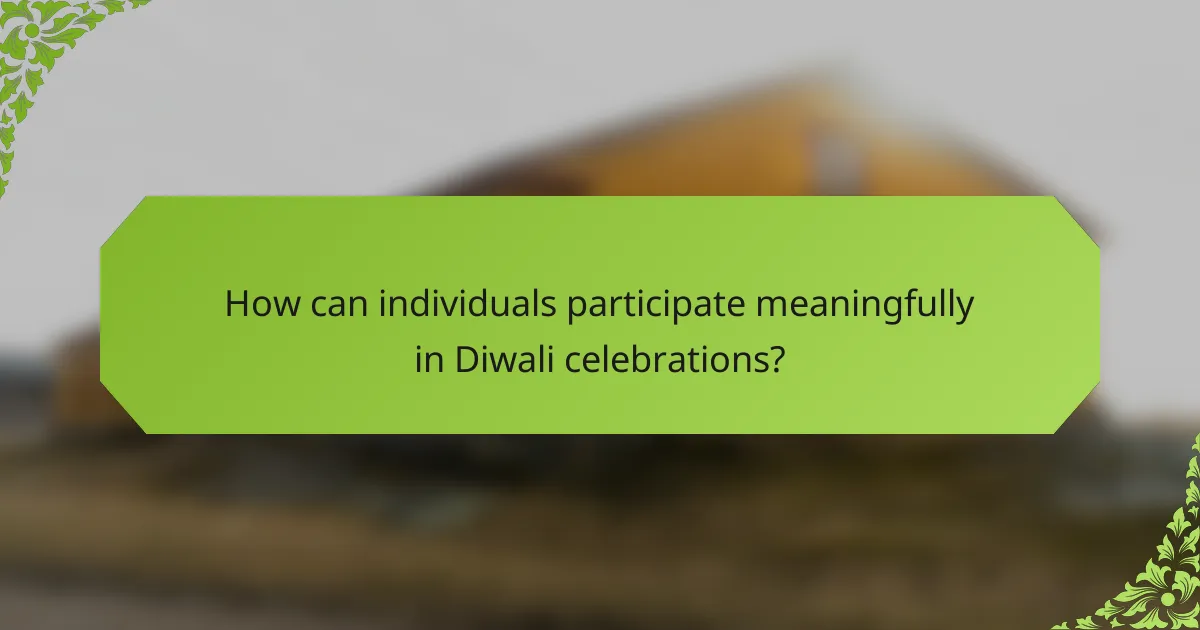
How can individuals participate meaningfully in Diwali celebrations?
Individuals can participate meaningfully in Diwali celebrations by engaging in community events, sharing traditional foods, and embracing cultural practices. Joining local festivals fosters a sense of belonging. Cooking and sharing dishes like samosas or sweets enhances communal bonds. Volunteering for events or donating to charities during this festive season amplifies the spirit of giving. Engaging in activities such as decorating homes with diyas and rangoli connects individuals to the cultural essence of Diwali.
What are some best practices for engaging in local Diwali events?
Engaging in local Diwali events involves active participation and community connection. Attend festivals, volunteer, and support local businesses to enhance the experience.
Participating in traditional activities like rangoli making or diya lighting fosters cultural appreciation. Joining community gatherings creates a sense of belonging and shared celebration.
Promoting local Diwali events through social media increases visibility and encourages attendance. Collaborating with local organizations can amplify outreach and engagement.
Lastly, sharing food traditions, such as preparing and distributing sweets, strengthens community bonds and spreads joy during the festival.
What tips can enhance the experience of celebrating Diwali in a multicultural setting?
To enhance the experience of celebrating Diwali in a multicultural setting, focus on inclusivity, shared traditions, and community engagement.
Encourage participation from diverse cultural backgrounds by inviting non-Hindu friends to join in festivities. Share traditional Diwali foods like sweets and snacks, fostering a sense of community through culinary experiences. Organize cultural exchange activities, such as storytelling or art workshops, to educate others about Diwali’s significance and traditions.
Create a welcoming atmosphere by decorating spaces with lights and rangoli, encouraging everyone to contribute. Incorporate music and dance from various cultures to celebrate diversity while honoring Diwali’s heritage.
